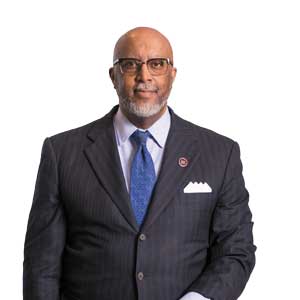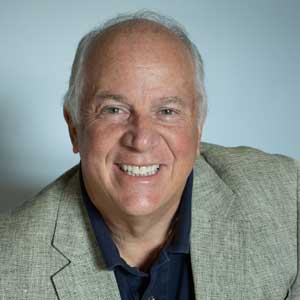Executive insights
Six Hampton Roads leaders discuss the impact of the pandemic on their organizations and the region at large, as well as the future of the region’s workforce and economy.
Executive insights
Six Hampton Roads leaders discuss the impact of the pandemic on their organizations and the region at large, as well as the future of the region’s workforce and economy.

Buffy Barefoot
President – Virginia Beach, TowneBank, Virginia Beach
What is the most pressing issue facing the Hampton Roads region in terms of its economic health?
The ability to attract companies offering shiny employment opportunities for young professionals graduating from college. Having one child who just graduated from college and another one in college, it appears the millennials’ line of sight for employment is in the bigger cities where companies like Facebook, Amazon, Apple, Netflix, Google and Tesla have meaningful presences. [Gen Z and millennials] are looking for culture and cutting-edge technologies when considering who they want to work for.
What new development would you most like to see in Hampton Roads in the next 10 years?
The establishment of a professional sports team. I recently visited Denver. It has four professional teams that play in or very near downtown. The financial impact is significant. Athletics create camaraderie, and our community would benefit from that.
How has the pandemic and its economic impact affected your customers’ focus?
Since we are in a resort community, undoubtedly the common focus most recently has been on employees. I’ve seen restaurant owners cooking, bartending and [doing] whatever else it takes to survive this year. We’ve seen restaurants completely shut down for lunch or dinner or additional days of the week due to lack of staff. Similarly, I’ve heard stories of hotel operators bringing in spouses and other family members to assist with housekeeping services. The inability to have J-1 [visa] workers, coupled with unemployment benefits, has stressed the industries. Additionally, our builders have been impacted by the supply chain. Costs of projects have escalated, and delivery of completion [on projects has been] delayed.

Hugh Barlow
Partner, Brown, Edwards & Co. LLP, Newport News
What development would you most like to see happen in the Hampton Roads area in the next 10 years?
We have heard for many years that Hampton Roads, by population, is one of few metropolitan areas without a major professional sports franchise. Despite many failed attempts over the past couple of decades, we have yet to get things figured out as a region to make it work. Over the next 10 years, it would bode well for this area for the seven cities and surrounding counties to figure out how we can make this happen.
What industry is changing the most in the region?
The brick and mortar retail stores, along with the restaurant industry, have undoubtedly been among the worst affected during the pandemic. This industry has seen the most changes over the past couple of years with online shopping, touchless pickup service, outdoor eating and takeout options, etc. to meet consumer needs and generate revenue. Those that have survived will need to continue providing innovative ways to attract new customers.

Gilbert Bland
President and CEO, Urban League of Hampton Roads, Norfolk
What do you consider the industries with the most growth potential for entrepreneurs in the Hampton Roads region?
I believe there will be many new entrepreneurial opportunities with the commencement of the offshore wind initiative. Secondly, the Port of Virginia’s continued growth. And, in my opinion, health care and medical research will develop and bring many new businesses to our region.
What is the most pressing issue facing the region in terms of its economic health?
Broadly, the concept of brain drain — i.e., our students exiting the area for employment and social opportunities — could be a major future impact on our efforts to sustain a strong workforce.
Personally, I believe Hampton Roads is quite simply a great place to live and work and raise a family. Our location along the waterfront is a wonderful and fun asset. Additionally, I also believe we have a national class health care system, which is an imperative asset for employees, particularly since life expectancies continue to grow.
What new development would you most like to see in Hampton Roads in the next 10 years?
I would love to see our region began to rival other areas in bio-medical research and the continued growth of our port.

Todd Estes
Executive director, Community College Workforce Cooperative, Newport News
What is the most pressing issue facing the Hampton Roads region in terms of its economic health?
Workforce development is now at the center of nearly every economic discussion. Access to a pipeline of skilled workers and the ability to respond to evolving workforce needs must be a regional priority. There are great programs already underway in Hampton Roads, but the biggest challenge is working to align and coordinate these efforts so we can achieve the comprehensive and sustainable workforce systems we need. Working independently, we can make Hampton Roads a better place for businesses. Working together, we can make Hampton the best place to do business in the nation. A true regional approach to workforce development is needed, and the region is indeed coming together. The CCWC demonstrates our colleges’ commitment to alignment and coordination, and we are working with our other strategic partners to ensure our region achieves the results we seek.
What industry has the best future in Hampton Roads?
Hampton Roads is a vibrant economic region with well-established industries that remain critical to the region and emerging industries that will certainly help diversify our economy. The Hampton Roads shipbuilding and ship repair industry is a national asset that also offers great career opportunities for those entering their gates. The emerging offshore wind industry is expected to create thousands of skilled jobs in our region over the next several years. A robust supply chain will be needed to support this new industry. Coupled with our existing advanced manufacturing base, we anticipate significant job opportunities in this area. An emphasis on the technology sector is increasing to include unmanned systems and cybersecurity. Of course, the need to support our front-line health care workers has never been more apparent or more important.

Toi Hunter
Vice president of business retention and expansion, Hampton Roads Alliance, Norfolk
What new development would you most like to see in Hampton Roads in the next 10 years?
The development of more industrial sites in our region would position Hampton Roads for major projects, specifically in the advanced manufacturing sector. In order to attract those types of projects, it is imperative that there are available sites with the appropriate infrastructure improvements to fit the needs of a major manufacturing project. Manufacturers bring machinery, tools and equipment [that increase] local tax revenue and create well-paying jobs — both direct and indirect. The first step for our region is ensuring that available sites meeting manufacturers’ criteria are shovel-ready and on the radar of corporate site selection consultants.
How has the pandemic and its economic impact affected the work of the Alliance?
The Alliance, like other economic development organizations, is focused on marketing the region for external investment. Regular travel, domestic and international, is an integral part of the economic development practice. Traveling to meet consultants and meet with companies considering investment is one of our core functions, so the pandemic dramatically changed the way that most economic development organizations conducted business. Business development has not stopped, but figuring out new and creative ways to engage potential prospects has changed. The Alliance has developed virtual site tours, online industry forums and innovative marketing efforts to stay engaged and to continue to keep the Hampton Roads region as a part of the conversation for corporate decision makers.

Kurt Krause
President and CEO, VisitNorfolk, Norfolk
What is the most pressing issue facing the Hampton Roads region in terms of its economic health?
The lack of a full workforce is the most pressing challenge that the Hampton Roads region is facing. We all need a comprehensive understanding and strategy on how to attract a diverse workforce to the region. This includes those with experience, leaving the military, graduating from school or seeking higher education. Our businesses need to value a workforce that is seeking a career or job hoping to fulfill their own succession plan.
What projects under development in Hampton Roads are most important for the area’s future?
The two developments happening in Hampton Roads that will be important to the future are the two casinos [in Norfolk and Portsmouth] and the proposed arena [redevelopment project at] Military Circle [Mall in] Norfolk. When casinos are developed, it will provide another attraction to the area’s long list of things to enjoy. The proposed arena will be a magnet for more entertainment, larger sporting events and general excitement and energy for the region. However, nothing can take away from the spectacular waterfront views that we are lucky to have from the Atlantic Ocean, Chesapeake Bay and the rivers.
-

















